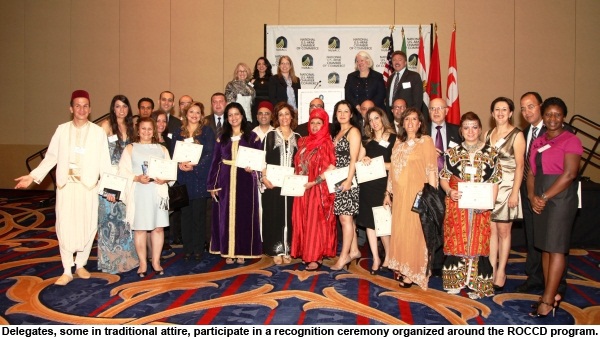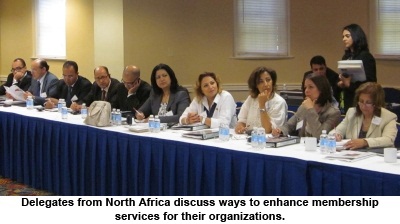U.S.-Arab Chamber, ISED Solutions, U.S. Department of
State Host Week-Long Membership Development and
Advocacy Forum for North African Business
Development Organizations
MEPI’s ROCCD Program Brings 26 Delegates to Washington DC
to Promote Trade and Access to Capital in North Africa
The National U.S.-Arab Chamber of Commerce (NUSACC), in cooperation with ISED Solutions, today wrapped up a week-long Washington, DC-based business leadership forum for 16 North Africa-based chambers of commerce and business associations. This first-of-its kind training program was made possible through a grant provided by the Middle East Partnership Initiative (MEPI) of the U.S. Department of State. [www.mepi.state.gov]

Twenty-six delegates representing business associations and chamber of commerce from Algeria, Egypt, Morocco, and Tunisia attended the Business Organizations Leadership Development (BOLD) workshop. The goal of the program was to provide North African delegates hands-on interactive case studies of innovative membership services models used by U.S. business associations, as well as an inside look into the advocacy strategies used by the American business community with their government counterparts. The delegates then worked on concrete action plans adapting the models and strategies to their local context and needs and ensuring that the lessons learned on this trip are carried forward.
Delegates made site visits in the nation's capital to the U.S. Departments of State and Commerce, the U.S. Trade & Development Agency, the World Bank, the International Monetary Fund, the Greater Washington Board of Trade, and the DC Small Business Development Center. Delegates also spent a day in Norfolk, Virginia, where they were hosted by the Virginia Port Authority and the Hampton Roads Chamber of Commerce, which provided briefings on regional economic drivers, including multimodal transportation and green technologies.
Delegates made site visits in the nation's capital to the U.S. Departments of State and Commerce, the U.S. Trade & Development Agency, the World Bank, the International Monetary Fund, the Greater Washington Board of Trade, and the DC Small Business Development Center. Delegates also spent a day in Norfolk, Virginia, where they were hosted by the Virginia Port Authority and the Hampton Roads Chamber of Commerce, which provided briefings on regional economic drivers, including multimodal transportation and green technologies.

Mr. Mehdi Alaya, representing the Chamber of Commerce & Industry of Tunis, said that "this training program has been an opportunity to work together with NUSACC and other chambers to address the needs of industry and business in Tunisia. We would like to create, through a partnership, a resource to provide much-needed information for Tunisian exporters and international businesspeople on regulations, process, and opportunities for engagement with their American counterparts."
Ms. Shereen Allam, representing the Association for Women's Total Advancement and Development, summed up the experience this way: "Egypt is a nation in transition, and to face our current challenges, we need to get our hands on business models, ideas, and any kind of support that can shorten our journey for a better tomorrow."
The BOLD program is part of the Results-Oriented Commercial Organization Capacity Development (ROCCD) Project, led by ISED Solutions and funded by MEPI, which aims to increase market opportunities and access to new investment capital for enterprises in the North African nations of Algeria, Egypt, Libya, Morocco, and Tunisia.
Ms. Shereen Allam, representing the Association for Women's Total Advancement and Development, summed up the experience this way: "Egypt is a nation in transition, and to face our current challenges, we need to get our hands on business models, ideas, and any kind of support that can shorten our journey for a better tomorrow."
The BOLD program is part of the Results-Oriented Commercial Organization Capacity Development (ROCCD) Project, led by ISED Solutions and funded by MEPI, which aims to increase market opportunities and access to new investment capital for enterprises in the North African nations of Algeria, Egypt, Libya, Morocco, and Tunisia.





